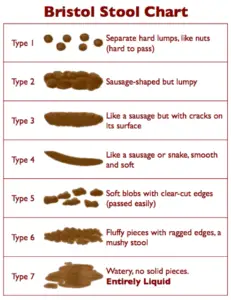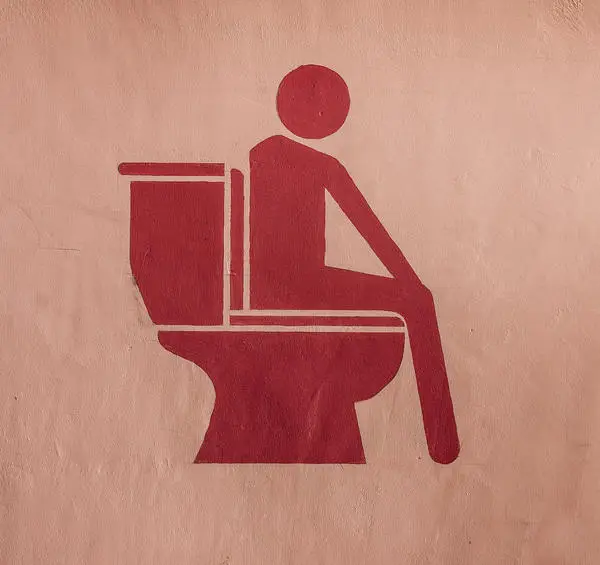Can Your Bowel Movement Be An Indicator of Digestive Health?
A stool or bowel movement is defined by the National Institute of Digestive Diseases as what is left after your digestive system (stomach, small intestine, and colon) breaks down and absorbs nutrients and fluids from what you eat and drink. While no one likes to talk about it, regular bowel movements are imperative to our health. In this blog article I’ll briefly cover what to be aware of in regards to bowel movements and what they can be indicative of in terms of our digestive health.
Bowel Movements – What Should I Be Aware of?
Unless you are suffering from intestinal issues, most of us don’t spend a lot of time thinking about our bowel movements. If you were asked to describe a normal bowel movement could you do it? Since there is no a standard definition of a “normal” bowel movement, don’t be worried if you struggled with that question. Bowel movements are highly individualized based on factors like diet and exercise. The key thing to be aware of is what is normal for you. Take note of the four characteristics below and let you doctor know if any of them change dramatically. It’s helpful to create a log of any changes with dates and use the Bristol Stool Chart diagram to describe the shape.
were asked to describe a normal bowel movement could you do it? Since there is no a standard definition of a “normal” bowel movement, don’t be worried if you struggled with that question. Bowel movements are highly individualized based on factors like diet and exercise. The key thing to be aware of is what is normal for you. Take note of the four characteristics below and let you doctor know if any of them change dramatically. It’s helpful to create a log of any changes with dates and use the Bristol Stool Chart diagram to describe the shape.
- Frequency – Your physician will want to know if there is a significant change in the number of times you have a bowel movement on a daily/weekly basis.
- Color – Most stools are light to a dark brown in color. If it is ever red, maroon or black then they may be an indicator of intestinal bleeding and you should notify your doctor. White or pale colored stools can be an indicator of issues with your liver or pancreas and should prompt you to seek medical attention.
- Shape – Use the Bristol Stool Chart on this page to help describe the shape of your bowel movements to your doctor. If the shape of your stool changes dramatically for more than a few days in a row, report that change to your doctor.
- Odor – Everyone’s stool has a foul odor mostly due to the food and bacteria in our bowel. A very fowl smelling stool that lasts awhile can be indicative of an intestinal infection or even blood and this would be a reason to notify your physician.
Bowel Movement Issues
Now that we’ve covered the primary characteristics to be aware of in regards to your bowel movements, I wanted to briefly describe the primary digestive issues that you should see your doctor for evaluation. This is not an inclusive list and as I mentioned earlier a physician should be consulted for all significant changes in one’s bowel movements.
- Constipation – A change in bowel movement frequency indicative of new onset constipation (firm infrequent stools) requires further medical evaluation. This change can be indicative of a colon or rectal cancer, a bowel obstruction, a colonic stricture, an anal fissure, nerve damage around the rectum, thyroid issues, anal or rectal muscle issues, significant dietary changes, and many other etiologies. It is important to seek medical attention when there is a significant and persistent change in bowel habits.
- Diarrhea – Occasional episodes of diarrhea are quite common. If diarrhea (loose, watery, frequent stools) becomes persistent, it may be indicative of other issues. Etiologies of persistent diarrhea include: infection (bacteria, viruses, parasites), medication effect, dietary intolerances (lactose intolerance, gluten intolerance, fructose intolerance, etc.), malignancy, inflammatory bowel disease, microscopic colitis, celiac disease, irritable bowel syndrome, and many other etiologies. This change in bowel habits requires further evaluation by a physician.
- Fecal Incontinence – Fecal incontinence occurs when one is unable to control or prevent the passage of stool from the rectum. This can occur with either liquid or formed stools. Fecal incontinence can have many different etiologies including: malignancy, anal and rectal nerve damage, muscle damage, severe diarrhea, severe constipation (with overflow diarrhea), damage from a previous surgery, or rectal prolapse (rectum drops down into and protrudes through the anus). You should seek medical attention for further evaluation if you are experiencing recurrent episodes of fecal incontinence.
- Rectal Bleeding (blood in the stool or on toilet paper) – Blood in your stool can range from red to maroon to black in color. All of these color changes indicate gastrointestinal blood loss. Generally speaking, dark to black colored stools indicate bleeding from the upper GI tract (esophagus, stomach, small intestine, or right colon). Maroon and red colored stools are usually indicative of colonic or rectal bleeding. If large amounts of blood are seen, or there are any associated symptoms such as lightheadedness, dizziness, shortness of breath, chest pain, etc, you should seek medical attention in an ER immediately. For smaller or recurrent episodes of blood in your stool, you should schedule an appointment with a gastroenterologist.
Bowel Movement – Key Indicator of Digestive Health
Bowel movements can be a key indicator of your overall digestive health. Changes could indicate a significant underlying health issue. A persistent change in the features of your bowel habits should prompt you to seek medical attention with a gastroenterologist. During your visit, your gastroenterologist will take a thorough history of your symptoms, perform a physical exam, and make further recommendations regarding evaluation and treatment. Your physician may recommend dietary changes, stool studies, blood tests, endoscopic evaluation, and several other possible tests to identify the causes of your symptoms.




Drew
It’s important to pay close attention to everything that goes on with your body. Usually, if there is something wrong with you, your body with be trying to tell you. Thanks for sharing.